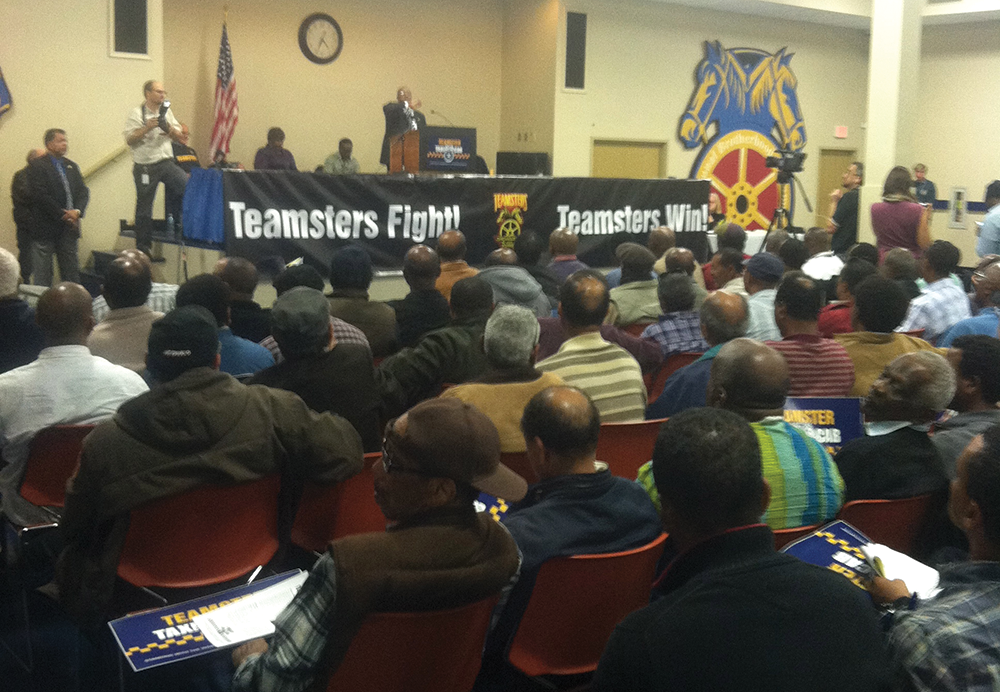
Ongoing frustrations between the District of Columbia Taxicab Commission and taxi drivers have culminated in the formation of a union and the establishment of the Washington, D.C. Taxi Operators Association, which held its first meeting Oct. 29.
A crowd of more than 1,000 D.C. cab drivers and Teamsters Union members gathered at the meeting to demand better representation and fewer hidden costs for individual drivers, with organizational help from Teamsters Local 922.
“The meeting was great, as there was a wonderful outpouring of support, and there appears to be tremendous interest in the association. By gaining the power of the union, these taxi drivers can truly begin to fight for change,” Teamsters Spokesperson Galen Munroe said.
More than 1,000 of the city’s 6,000 cab drivers had already signed union membership papers before the meeting, according to Teamsters Local 639 President Thomas Ratliff, who held the inaugural DCTOA meeting.
Union organizers are hopeful that the DCTOA will follow in the footsteps of the 500 Seattle taxi drivers who formed the Western Washington Taxicab Operators Association last year, which has been largely successful in winning better wages for drivers and representing them in taxicab legislation.
Taxi drivers and Teamster organizers alike emphasized the strength of unity in combating alleged DCTC injustices.
“We must stay strong and fight back for our equal rights. We will not be disrespected by the DCTC. We must have a voice in the decision-making process,” taxi driver Mohamud Samantar said.
The creation of the association is the result of protests against D.C. requirements for all taxi drivers to carry the Modern Taximeter System, which includes GPS capabilities and a credit card reader. Drivers, however, have struggled due to the costs of the mandatory update, which requires returning 25 cents to DCTC per trip. Taxi drivers have also complained of a shortage of MTS providers and penalties they will face if they do not meet the requirements, which also include installing dome lights, by the Nov. 1 deadline.
“We have talked to drivers and have come to understand their concerns with these new regulations. The taxi drivers feel that the regulations are causing them a lot of financial issues and that the process hasn’t been smooth in its implementation largely because drivers were not properly consulted,” Munroe said. “Taxi drivers in this city want a bigger voice in how the city treats them.”
Munroe expressed concern at DCTC’s refusal to extend the Nov. 1 deadline despite the fact that many drivers haven’t yet received dome lights due to the large demand, which has also driven up prices.
“This deadline means that many drivers who wished to comply to the regulation will still have their cars towed and impounded, just because their light hasn’t arrived yet. We think that this is unjust,” Munroe said.
According to the Teamsters, the average D.C. cab driver makes $25,000 to $30,000 a year and spends as much as $40 a day on fuel and $100 a month on auto insurance.
“I’m preparing to sign up for the union because I’ve had to pay $400 for the dome light, instead of the $180 that was promised by the DCTC. Also, the taxi tracker chip is really expensive and it’s an invasion of our privacy. We need more of a say in how we have to operate, and we’ll say it as one, both cab company owners and drivers together,” DCTC commissioner and 50-year taxi driver Stanley Tapscott said.
DCTC spokesperson Neville Waters declined to comment on the recent unionization of DCTOA but said that DCTC has been in communication with drivers.
“We have two active drivers on our commission board, which consisted of only eight members, all appointed by the mayor. We are in constant contact with drivers, and we take their feedback. We meet with drivers every month, and we have had discussions with the two existing taxi driver associations in the city,” he said. “The DCTC is a regulatory body, so if drivers don’t install the new upgrades, of course we have to enforce the legislation.”














